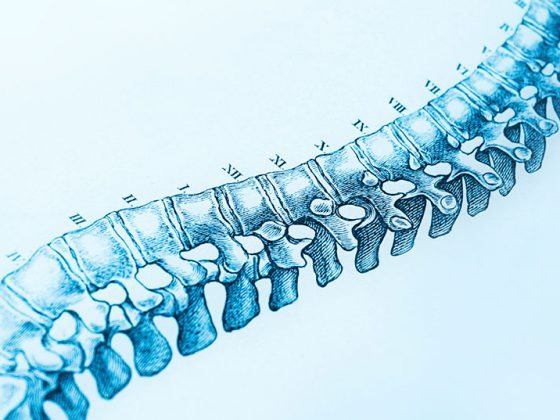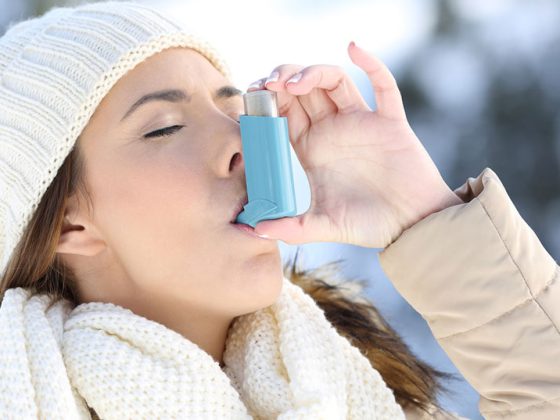When patients with moderate to severe depression do not respond to two different antidepressants, further therapeutic options have been very limited. With approval of the new esketamine nasal spray, there is now hope. This is because the first new mechanism of action in 30 years achieves a significant reduction in depression symptoms when combined with an oral antidepressant.
About half a million Swiss suffer from major depressive disorder (MDD) [1]. This disease causes a range of physical, emotional, and cognitive symptoms, such as loss of interest, fatigue, difficulty concentrating, and a depressed mood [2,3]. This affects many aspects of daily life – including health, relationships, work life, and quality of life itself [4]. The disease burden is enormous. Moreover, MDD often entails other serious diseases, such as cancer, coronary heart disease, epilepsy, or multiple sclerosis [5].
Effective treatment aims at alleviating depression symptoms, as well as remission [6]. However, about one-third of affected individuals do not respond to currently available therapies [7]. When no improvements in symptoms can be achieved after two different antidepressants in patients with moderate to severe depression during the episode, the term treatment-resistant depression (TRD) is used. Now – for the first time in 30 years – a new active principle can be used for these patients.
Renew synaptic connections
In combination with an oral antidepressant, the new esketamine nasal spray (SPRAVATO®) can be used to treat adults with TRD. The drug, an antagonist at the N-methyl-D-aspartate glutamate receptor, is thought to help restore synaptic connections between brain cells. This enables an increase in activity and communication in certain brain regions. This increase promotes improvement in depression symptoms [8,9]. In a total of five Phase III studies, more than 1600 patients were examined. It was found that the efficacy of the combination therapy of esketamine nasal spray and oral antidepressant was observed from the second day and significantly more reduced depression symptoms than a combination of oral antidepressant with placebo nasal spray [10]. Approximately 70% of esketamine-treated patients responded to treatment by reducing symptoms by ≥50%. In addition, about half of all those treated achieved remission at the end of the four-week studies. The risk of relapse was also reduced by 70% in patients with stable response and by 21% in those with stable remission by continuing treatment with SPRAVATO® [11]. The efficacy of the new treatment option was maintained over a period of up to one year [10–14]. Overall, esketamine nasal spray has a favorable benefit-risk profile. The new preparation is administered by the patients themselves into the nose with the aid of a disposable applicator.
Thus, an additional option for the treatment of treatment-resistant depression with a novel mechanism of action is now available to address the unmet need for innovative and fast-acting compounds.
Source: Janssen-Cilag AG
Literature:
- Baer N, et al: Obsan Report 56.2013. p.10. Available at: www.obsan.admin.ch/sites/default/files/publications/2015/obsan_56_bericht.pdf (last accessed 01.09.2020).
- World Health Organization (WHO). International Classification of Diseases11th Revision (ICD-11). 6A71.3.2019. Available at: https://icd.who.int/browse11/l-m/en (last accessed on 01.09.2020)
- American Psychological Association (APA). Diagnostic and Statistical Manual of Mental Disorders.5th ed. 2013.
- Lepine JP, Briley M: The increasing burden of depression. Neuropsychiatric Dis Treat 2011; 7(suppl. 1): 3-7.
- National Institute of Mental Health. Chronic illness and mental health. Available at: www.nimh.nih.gov/health/publications/chronic-illness-mental-health/index.shtml (last accessed on 01.09.2020)
- National Institute for Health and Care Excellence (NICE). Depression in adults: recognition and management. Clinical guidelines [CG90]. Available at: www.nice.org.uk/guidance/cg90/chapter/1-guidance (last accessed on 01.09.2020)
- Ionescu D, et al: Dialogues Clin Neurosci 2015; 17(2): 111-126.
- Duman RS: Ketamine and rapid-acting antidepressants: a new era in the battle against depression and suicide. F1000Research 2018; 7: 659.
- Johnson & Johnson Ltd. press release on February 2019: FDA advisory committee recomments approval of SPRAVATOTM (esketamine) CIII nasal spray for adults with Treatment-Resistant Depression (TRD) who have cycled through multiple treatments without relief. Available at: www.jnj.com/janssen-announces-u-s-fda-approval-of-spravatotm-esketamine-cii-nasal-spray-for-adults-with-treatment-resistant-depression-trd-who-have-cycled-through-,ultiple-treatments-without-relief (last accessed on 01.09.2020)
- Popova V, et al: Am J Psychiatry 2019. doi:10.1176/appl.ajp.2019.19020172. [Epub ahead of print]
- Daly E, et al: JAMA Psychiatry 2019. doi:10.1001/jamapsychiatry.2019.1189. [Epub ahead of print]
- Ochs-Ross R, et al: Am J Geriatr Psychiatry 2020; 28(2): 121-141.
- Fedgchin M, et al: Int J Neuropsychopharmacol 2019. doi:10.1093/ljnp/pyz039. [Epub ahead of print]
- Wajs E et al. J Clin Psychiatry 2020; 81(3): 19m12891.
HAUSARZT PRAXIS 2020; 15(10): 23
InFo NEUROLOGY & PSYCHIATRY 2020; 18(6): 47.











